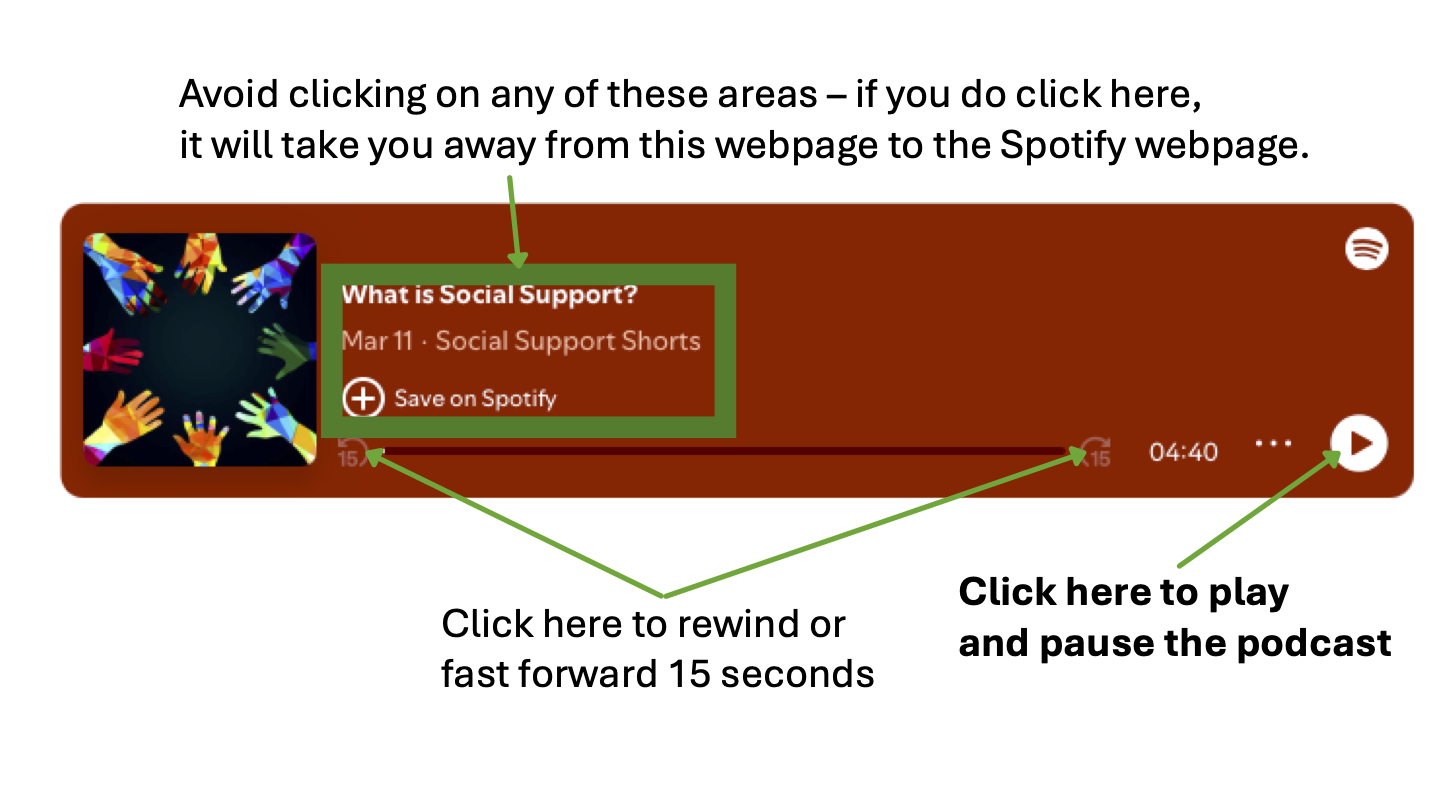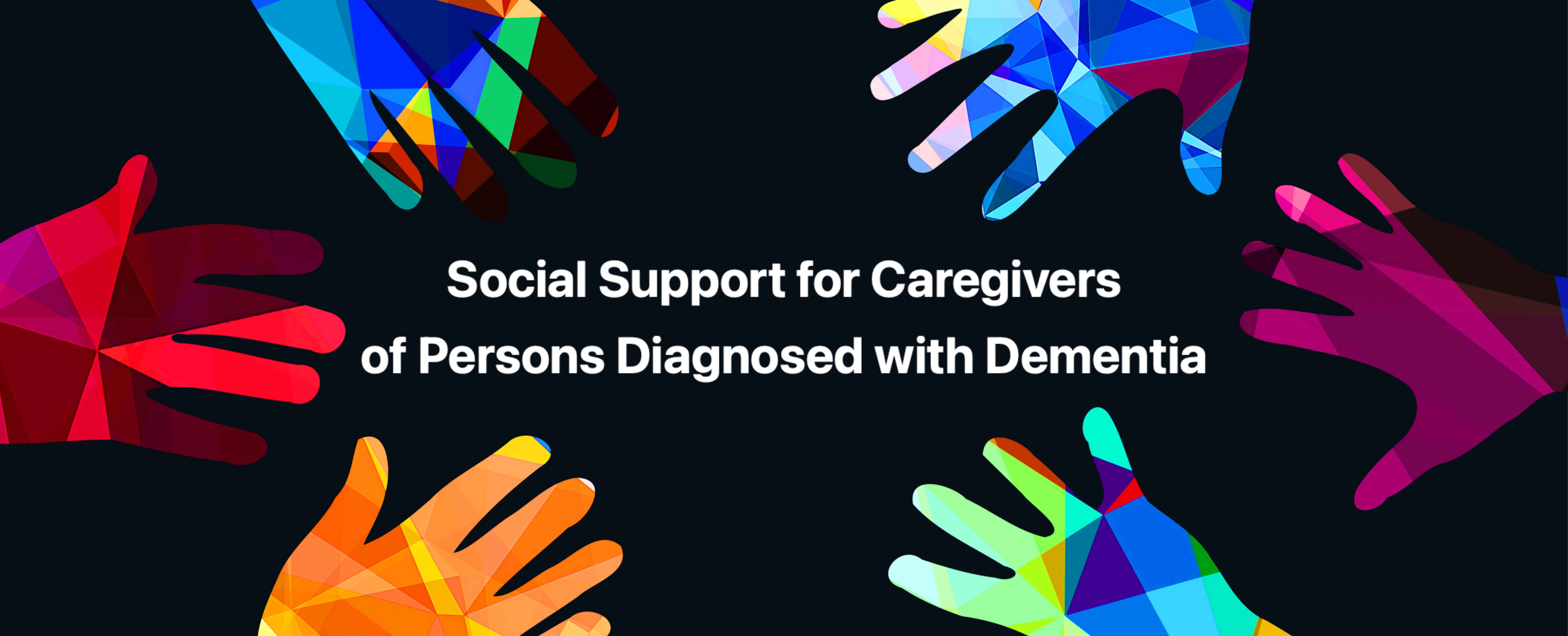Caregiving can be a beautiful and meaningful experience, and it can also feel overwhelming and isolating. There are so many responsibilities – we need the support of others.
Journey through this podcast series with us to learn more about social support and how to potentially enhance the quality and amount of support you are receiving.
About Social Supports Shorts
Caregiving can be a rewarding experience. It can also have its challenges. One of the challenges can be maintaining social support, which is an essential contributor to quality of life. For many caregivers, feeling connected and supported by important others in their lives can help manage the negative feelings that caregivers can commonly experience.
Through listening to these podcasts you will learn about social support and why it may be important to you as a caregiver. We also discuss evidence-based strategies/techniques to potentially expand your circle of support and enhance the level and quality of the support you receive.
Social Support Shorts is a series of podcasts developed for caregivers by a research group that includes members from both the Alzheimer Society of Saskatchewan and the Department of Psychology at the University of Saskatchewan.

Podcast Listening Instructions
To play the podcasts directly from our website, please select the podcast episode of your choice and press the play button at the lower right of each episode (▶️). To pause at any time, press pause (⏸️). To resume playing the episode, press play again (▶️).

Please note that podcast playback on this website works best with the latest versions of the Safari (Mac) and Chrome (Mac/PC) web browsers.
(Optional: Podcast Download Instructions)
(These podcasts are hosted by Spotify. To download the podcasts for listening while you are on the go, you will need a Spotify account and the Spotify app. Please refer to Spotify for support/instructions on downloading the app, downloading the podcasts, and using their player. You can click here to access Spotify's website.)
(To find Social Support Shorts on Spotify's website, search "Social Support Shorts" in the search bar at the top middle of the page, then select "Podcasts and Shows" right below or please click here to go directly to the site.)
(Optional: Slowing Down or Speeding Up the Podcasts)
For some individuals, the rate of speech in the podcasts could be too slow. For others, it could be too fast. If you would like to speed up or slow down the rate of speech in the podcasts, you need to change the playback speed. The option to change playback speeed is only offered in the Spotify app. Details about creating a Spotify account and downloading the app are in the previous section (Podcast Download Instructions). Once the app is downloaded you need to sign in to your spotify account, then navigate to the Social Supports Shorts podcasts (again, see the download section above for how to search). Now pick the episode you would like to listen to and click on the "play" icon (▶️). The podcast is now playing. At the bottom of the app, you should see the name of the specific podcast episode on the left, and, to the right of that, the player's control icons. Look for the 1x, and click on it. you should now have playback speed options as shown below:
 Anything under 1x speed (i.e., 0.9x to 0.5x) would slow down the pace of speech. Anything above 1x speed (i.e., 1.1x to 3.5x) would speed up the pace of speech. Select the speed you would like by clicking on the number. Follow the same instructions to change the playback speed until you find a pace of speech that is comfortable for you.
Anything under 1x speed (i.e., 0.9x to 0.5x) would slow down the pace of speech. Anything above 1x speed (i.e., 1.1x to 3.5x) would speed up the pace of speech. Select the speed you would like by clicking on the number. Follow the same instructions to change the playback speed until you find a pace of speech that is comfortable for you.
Social Support Shorts: Podcast Episodes and Handouts
Some listeners may like to write notes as they progress through the podcasts. We have designed a printable support notes page which can be downloaded here: Click here to download the Social Support Notes handout
Episode 1: Introduction to Social Support
Join Dr. Megan O'Connell and your podcast host, O'Connell lab member August Kortzman, as they discuss social support and why it is important for caregivers.
Episode 2: What is Social Support?
Our host August explains the basics of social support and what we will be learning through this course.
Episode 3: Social Support Superpower 1: The Listener
August introduces the first of four types of social support superpowers - The Listener. The episode also introduces the Social Support Superpowers Worksheet, which can be downloaded for printing by clicking this link:To download the Social Support Superpowers Worksheet click here!
Episode 4: Social Support Superpowers: The Cheerleader
August introduces the second social support superpower - The Cheerleader. To download the Social Support Superpowers Worksheet click here!
Episode 5: Social Support Superpowers: The Doer
August introduces the third social support superpower - The Doer. To download the Social Support Superpowers Worksheet click here!
Episode 6: Social Support Superpowers: The Knower
August introduces the fourth and final social support superpower - The Knower. To download the Social Support Superpowers Worksheet click here!
Episode 7: Matching the Social Support Superpower
This episode emphasizes the importance of matching the social support superpower to the appropriate support resource, and provides guidance on how to accomplish that match. To download the Social Support Superpowers Worksheet click here!
Episode 8: Social Support Recap
This episode reviews the definition of social support, why it's important, and the different types of support (also known as the social support superpowers). It ensures that there is a common language going forward as we begin introducing tools to help enhance social support.
Episode 9: Circle of Support Exercise
This episode introduces the first of several tools that may help to enhance levels of social support. It's a good idea to have a paper and pen/pencil handy, as you will be drawing the Circle of Support tool. You may also want to find some household items that will help you trace two different-sized circles (for example, a water glass and a dessert plate).
(Optional: we have also prepared a printable two-page Circle of Support Worksheet which has an example on the second page and can be downloaded here: Click here to download a printable Circle of Support Worksheet)
Episode 10: Discovering Sources of Social Support
This episode introduces the second tool that may help to enhance levels of social support. We invite you to have that paper and pen/pencil handy to take notes. This exercise will be completed in your real life, outside the podcast, and you may want to write down the steps to take to complete it.
Episode 11: Communicating Your Needs with Grace
In this episode, August teaches us about communicating in ways that will draw support to us and help us to get our needs met.
Episode 12: What could be getting in the way? Barriers to seeking help.
In this episode, August shares some thoughts on why caregivers might be hesitant to ask for help. He discusses some common barriers and offers ideas on how to overcome them.
Episode 13: Coping Beyond Social Support
Sometimes you may need more than social support to help manage the stress that can occur with the caregiving role. In this final episode of the series, August provides other coping resources and wraps up the Social Support Shorts journey.
Bonus Episode: Social Support Shorts are for Everyone
In this episode, August highlights that these resources are for every caregiver at any stage of their journey, including near the end, when the person diagnosed with dementia has transitioned into a care home - think of how valuable communicating with grace can be when developing an alliance with care home staff.
Other Coping Resources
All the following resources are completely free (no subscription required). If there is a pop-up offering a subscription, just click on the "X" in the right or left corner to close the pop-up.
Coping Resources (Click the title to open the resource in a new tab):
The Emotional Side of Caregiving (Website) A fact sheet from the Family Caregiver Alliance that identifies some of the common feelings that caregivers experience and offers suggestions for how you might better cope.
Healthy Coping: 24 Mechanisms and Skills for Positive Coping (Website) A PositivePsychology.com weppage that provides a background on healthy coping and offers multiple healthy coping strategies.
Box Breathing Explained (Video) Describes the "why" behind box breathing and offers a short box breathing exercise that is discrete and can be used any time you are feeling stressed.
Box Breathing Relaxation Exercise (Video) For those who do not need the "why" and just want to get to the box breathing exercise.
Soothing with the 5 Senses (Worksheet) A simple exercise that can be used in your everyday life to help soothe yourself when feeling stressed. Discrete and can be used at any time.
Greater Good in Action (Website) A website from Berkeley University's Greater Good Science Center that offers many coping exercises - consider checking a few out to increase your coping toolkit (e.g., mindfulness, self-compassion, and gratitude).
Self-Compassion Break (Website) A direct link to the Greater Good Science Center's 5-minute self-compassion exercise.
Gratitude Journal (Website) A direct link to the Greater Good Science Center's gratitude journal exercise.
About the Research Team
Social Support Shorts are a series of podcasts developed for caregivers by a research group that includes members from the Alzheimer Society of Saskatchewan and the Department of Psychology at the University of Saskatchewan. Team members from the Alzheimer's Society of Saskatchewan include Director of Programs and Services Joanne Michael, Program Manager Heather Dash, and Support Group Facilitators Stacie Noble-Wiebe, Connie Snider, Eunice Morck, Jackie Stokvis-Flaherty, Diane Lemon, and Erica Matthews. The University of Saskatchewan team is led by Dr. Megan O'Connell (megan.oconnell@usask.ca) and includes O'Connell lab members August Kortzman and Shoshana Green. (Special thanks to past research team member(s) Karen Marcinkiw.)
This project was generously funded by the Saskatchewan Health Research Foundation.
Additional Resources
If you reside in Saskatchewan and would like to access further support, please contact the Alzheimer Society of Saskatchewan's Dementia Helpline (available 8:30 am to 4:30 pm, Monday through Friday):
Phone: 1-877-949-4141
Email: helpline@alzheimer.sk.ca
If you reside in another province or territory and would like to access further support, please click here to access the contact information for your local Alzheimer Society
Acknowledgements





